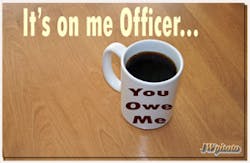It's On Me Officer
It still happens to this day, you go into a fast food joint or restaurant on a lunch break and they offer you free coffee and/or food. To some of us the dilemma that this presents is non-existent; we simply don't accept anything for free. Others of us do have a problem with deciding what to do - accept it or not? What's the harm? But have you ever stopped to think just what that free cup of coffee really costs?
I don't imagine that there is any academy today that does not teach that accepting any material thing or service, free of charge, is ethically correct. Consider what we do: we perform a public service for which we are paid a salary. That money comes from the taxes that John Q. Public pays. To accept anything over and above your salary is abjectly wrong. That's point number one. Point number two is that it is very rare that someone will give a cop anything for free without expecting something in return. That's just human nature. When we give something to someone, we expect something in return. That something can be any number of things in the genre of police work.
I recall years ago in Chicago, the ethnic neighborhoods were such that taverns and restaurants occupied most corners. The majority of the clientele were regulars from the neighborhoods themselves and as such, there were very few problems in these establishments. But every once in a while, some thug would run inside with a gun and try to stick the joint up. The owners devised their own way of dealing with the problem - they welcomed and encouraged the uniform beat cops to eat in their places free of charge. The rationale for the owner was that a free meal was cheap insurance against getting robbed. The cop justified the freebie by rationalizing that he was actually working while he was on lunch break, since he had to handle anything police related that might happen while he was there. This "quid pro quo" existed in most of the old neighborhoods throughout the city. No one raised an eyebrow, figuring both parties benefited from the arrangement. It was a comfortable arrangement.
What evolved over time however was that the tavern keeper began to expect more from the cop in return for that free meal. Little by little the owner would make requests, like asking the officer to stay a little longer or to come in several times during his shift not just on lunch break, or ask the cop to show up at closing time for a few free drinks. Some cops obliged, still not realizing that that freebie was turning into a millstone around his neck. For that little or no cost plate of food, the cop was now supplying special favors to a private citizen without justification. Indeed, the extra time spent at Bob's Bar, was endangering other citizens on the beat because Bob was getting favored treatment.
Sometimes the gratuity isn't as blatant as what I described with the bar owners. Consider the ubiquitous 7-11 type convenience stores. They are a magnet for cops and a primer for robbers. Sometimes you will find several uniforms there because it may be the only place open on midnights, or the only place with clean restrooms. But pretty soon the manager gets comfortable with the idea of having uniforms and marked cars around. He knows that the bad guys see this as well, and the owner's hope is that the knuckle draggers will not use his store for basic robbery training. Pretty soon those free cups of coffee turn into free donuts or chips, and now there's a problem on both sides of the counter.
What about Joe Public? He waits in line to pay for his gallon of milk, all the while watching the cops getting Carte blanche on everything in the store. How do you suppose he feels about that, knowing that most cops make a decent salary? For that matter, how does the cop feel about accepting freebies? Does he feel any remorse or guilt?
The bottom line is this: anyone in public service is wrong to accept any thing or service, without paying full price, if that gift or discount was extended as a result of the individual's official office. It is that simple. It is not a decision that anyone of us should have to wrestle with. Although accepting something for nothing seems unimportant at the time, that act will always be there, both in the giver's mind and the receiver's mind. Accepting that free cup of coffee may one day come back to haunt you and blemish an otherwise sterling career and reputation.
So what does one do when that situation presents itself? What do you do when the fast food restaurant manger tells you "It's on me officer"? Your answer should be: "Thank you, but I prefer to pay for my meal as do all of your customers." You then insist on paying full price. If they refuse your money, your only options are to either leave the food on the counter, or throw down what you know to be an amount that will cover the meal. Anything short of that is unethical behavior for a public servant. Incidentally, don't think that for one moment someone isn't watching you to see what you will do in that situation.
A free cup of coffee costs much more than you could ever imagine. It comes with strings attached and consequences that have serious implications. Don't put yourself at risk for what you may think is a gesture of kindness on someone's part. Be beholden to no one but yourself, and you will discover that honest cops sleep much better at night than those that are not. Stay safe brothers and sisters!
